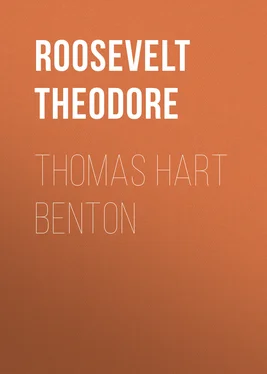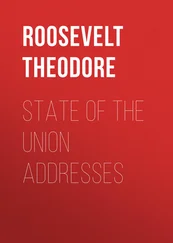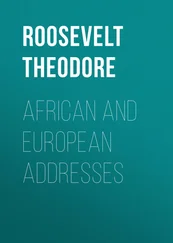Theodore Roosevelt - Thomas Hart Benton
Здесь есть возможность читать онлайн «Theodore Roosevelt - Thomas Hart Benton» — ознакомительный отрывок электронной книги совершенно бесплатно, а после прочтения отрывка купить полную версию. В некоторых случаях можно слушать аудио, скачать через торрент в формате fb2 и присутствует краткое содержание. Жанр: foreign_prose, История, foreign_edu, foreign_antique, на английском языке. Описание произведения, (предисловие) а так же отзывы посетителей доступны на портале библиотеки ЛибКат.
- Название:Thomas Hart Benton
- Автор:
- Жанр:
- Год:неизвестен
- ISBN:нет данных
- Рейтинг книги:4 / 5. Голосов: 1
-
Избранное:Добавить в избранное
- Отзывы:
-
Ваша оценка:
- 80
- 1
- 2
- 3
- 4
- 5
Thomas Hart Benton: краткое содержание, описание и аннотация
Предлагаем к чтению аннотацию, описание, краткое содержание или предисловие (зависит от того, что написал сам автор книги «Thomas Hart Benton»). Если вы не нашли необходимую информацию о книге — напишите в комментариях, мы постараемся отыскать её.
Thomas Hart Benton — читать онлайн ознакомительный отрывок
Ниже представлен текст книги, разбитый по страницам. Система сохранения места последней прочитанной страницы, позволяет с удобством читать онлайн бесплатно книгу «Thomas Hart Benton», без необходимости каждый раз заново искать на чём Вы остановились. Поставьте закладку, и сможете в любой момент перейти на страницу, на которой закончили чтение.
Интервал:
Закладка:
It was not in Tennessee, however, that Benton rose to political prominence, for shortly after the close of the war he crossed the Mississippi and made his permanent home in the territory of Missouri. Missouri was then our extreme western outpost, and its citizens possessed the characteristic western traits to an even exaggerated extent. The people were pushing, restless, and hardy; they were lawless and violent to a degree. In spite of the culture and education of some families, society, as a whole, was marked by florid unconventionality and rawness. The general and widespread intemperance of the judges and high officials of state was even more marked than their proclivities for brawling. The lawyers, as usual, furnished the bulk of the politicians; success at the bar depended less upon learning than upon "push" and audacity. The fatal feuds between individuals and families were as frequent and as bloody as among Highland clans a century before. The following quotations are taken at random from a work on the Bench and Bar of Missouri, by an ex-judge of its supreme court: "A man by the name of Hiram K. Turk, and four sons, settled in 1839 near Warsaw, and a personal difficulty occurred between them and a family of the name of Jones, resulting in the death of one or two. The people began to take sides with one or the other, and finally a general outbreak took place, in which many were killed, resulting in a general reign of terror and of violence beyond the power of the law to subdue." The social annals of this pleasant town of Warsaw could not normally have been dull; in 1844, for instance, they were enlivened by Judge Cherry and Senator Major fighting to the death on one of its principal streets, the latter being slain. The judges themselves were by no means bigoted in their support of law and order. "In those days it was common for people to settle their quarrels during court week.... Judge Allen took great delight in these exhibitions, and would at any time adjourn his court to witness one.... He (Allen) always traveled with a holster of large pistols in front of his saddle, and a knife with a blade at least a foot long." Hannibal Chollop was no mere creature of fancy; on the contrary, his name was legion, and he flourished rankly in every town throughout the Mississippi valley. But, after all, this ruffianism was really not a whit worse in its effects on the national character than was the case with certain of the "universal peace" and "non-resistance" developments in the Northeastern States; in fact, it was more healthy. A class of professional non-combatants is as hurtful to the real, healthy growth of a nation as is a class of fire-eaters; for a weakness or folly is nationally as bad as a vice, or worse; and, in the long run, a Quaker may be quite as undesirable a citizen as is a duelist. No man who is not willing to bear arms and to fight for his rights can give a good reason why he should be entitled to the privilege of living in a free community. The decline of the militant spirit in the Northeast during the first half of this century was much to be regretted. To it is due, more than to any other cause, the undoubted average individual inferiority of the Northern compared to the Southern troops; at any rate, at the beginning of the great war of the Rebellion. The Southerners, by their whole mode of living, their habits, and their love of out-door sports, kept up their warlike spirit; while in the North the so-called upper classes developed along the lines of a wealthy and timid bourgeoisie type, measuring everything by a mercantile standard (a peculiarly debasing one if taken purely by itself), and submitting to be ruled in local affairs by low foreign mobs, and in national matters by their arrogant Southern kinsmen. The militant spirit of these last certainly stood them in good stead in the Civil War. The world has never seen better soldiers than those who followed Lee; and their leader will undoubtedly rank as without any exception the very greatest of all the great captains that the English-speaking peoples have brought forth—and this, although the last and chief of his antagonists may himself claim to stand as the full equal of Marlborough and Wellington.
The other Western States still kept touch on the old colonial communities of the sea-coast, having a second or alternative outlet through Louisiana, newly acquired by the United States, it is true, but which was nevertheless an old settled land. Missouri, however, had lost all connection with the sea-coast, and though, through her great river towns, swarming with raftsmen and flat-boatmen, she drove her main and most thriving trade with the other Mississippi cities, yet her restless and adventure-loving citizens were already seeking other outlets for their activity, and were establishing trade relations with the Mexicans; being thus the earliest among our people to come into active contact with the Hispano-Indian race from whom we afterwards wrested so large a part of their inheritance. Missouri was thrust out beyond the Mississippi into the vast plains-country of the Far West, and except on the river-front was completely isolated, being flanked on every side by great stretches of level wilderness, inhabited by roaming tribes of warlike Indians. Thus for the first time the borderers began to number in their ranks plainsmen as well as backwoodsmen. In such a community there were sure to be numbers of men anxious to take part in any enterprise that united the chance of great pecuniary gain with the certainty of even greater personal risk, and both these conditions were fulfilled in the trading expeditions pushed out from Missouri across the trackless wastes lying between it and the fringe of Mexican settlements on the Rio del Norte. The route followed by these caravans, which brought back furs and precious metals, soon became famous under the name of the Santa Fé trail; and the story of the perils, hardships, and gains of the adventurous traders who followed it would make one of the most striking chapters of American history.
Among such people Benton's views and habits of thought became more markedly Western and ultra-American than ever, especially in regard to our encroachments upon the territory of neighboring powers. The general feeling in the West upon this last subject afterwards crystallized into what became known as the "Manifest Destiny" idea, which, reduced to its simplest terms, was: that it was our manifest destiny to swallow up the land of all adjoining nations who were too weak to withstand us; a theory that forthwith obtained immense popularity among all statesmen of easy international morality. It cannot be too often repeated that no one can understand even the domestic, and more especially the foreign, policy of Benton and his school without first understanding the surroundings amidst which they had been brought up and the people whose chosen representatives they were. Recent historians, for instance, always speak as if our grasping after territory in the Southwest was due solely to the desire of the Southerners to acquire lands out of which to carve new slave-holding states, and as if it was merely a move in the interests of the slave-power. This is true enough so far as the motives of Calhoun, Tyler, and the other public leaders of the Gulf and southern sea-board states were concerned. But the hearty Western support given to the movement was due to entirely different causes, the chief among them being the fact that the Westerners honestly believed themselves to be indeed created the heirs of the earth, or at least of so much of it as was known by the name of North America, and were prepared to struggle stoutly for the immediate possession of their heritage.
One of Benton's earliest public utterances was in regard to a matter which precisely illustrates this feeling. It was while Missouri was still a territory, and when Benton, then a prominent member of the St. Louis bar, had by his force, capacity, and power as a public speaker already become well known among his future constituents. The treaty with Spain, by which we secured Florida, was then before the Senate, which body had to consider it several times, owing to the dull irresolution and sloth of the Spanish government in ratifying it. The bounds it gave us were far too narrow to suit the more fiery Western spirits, and these cheered Benton to the echo when he attacked it in public with fierce vehemence. "The magnificent valley of the Mississippi is ours, with all its fountains, springs, and floods; and woe to the statesman who shall undertake to surrender one drop of its water, one inch of its soil to any foreign power." So he said, his words ringing with the boastful confidence so well liked by the masterful men of the West, strong in their youth, and proudly conscious of their strength. The treaty was ratified in the Senate, nevertheless, all the old Southern States favoring it, and the only votes at any stage recorded against it being of four Western senators, coming respectively from Ohio, Kentucky, Tennessee, and Louisiana. So that in 1818, at any rate, the desire for territorial aggrandizement at the expense of Maine or Mexico was common to the West as a whole, both to the free and the slave states, and was not exclusively favored by the Southerners. The only effect of Benton's speech was to give rise to the idea that he was hostile to the Southern and Democratic administration at Washington, and against this feeling he had to contend in the course of his successful candidacy for the United States senatorship the following year, when Missouri was claiming admittance to the Union.
Читать дальшеИнтервал:
Закладка:
Похожие книги на «Thomas Hart Benton»
Представляем Вашему вниманию похожие книги на «Thomas Hart Benton» списком для выбора. Мы отобрали схожую по названию и смыслу литературу в надежде предоставить читателям больше вариантов отыскать новые, интересные, ещё непрочитанные произведения.
Обсуждение, отзывы о книге «Thomas Hart Benton» и просто собственные мнения читателей. Оставьте ваши комментарии, напишите, что Вы думаете о произведении, его смысле или главных героях. Укажите что конкретно понравилось, а что нет, и почему Вы так считаете.












